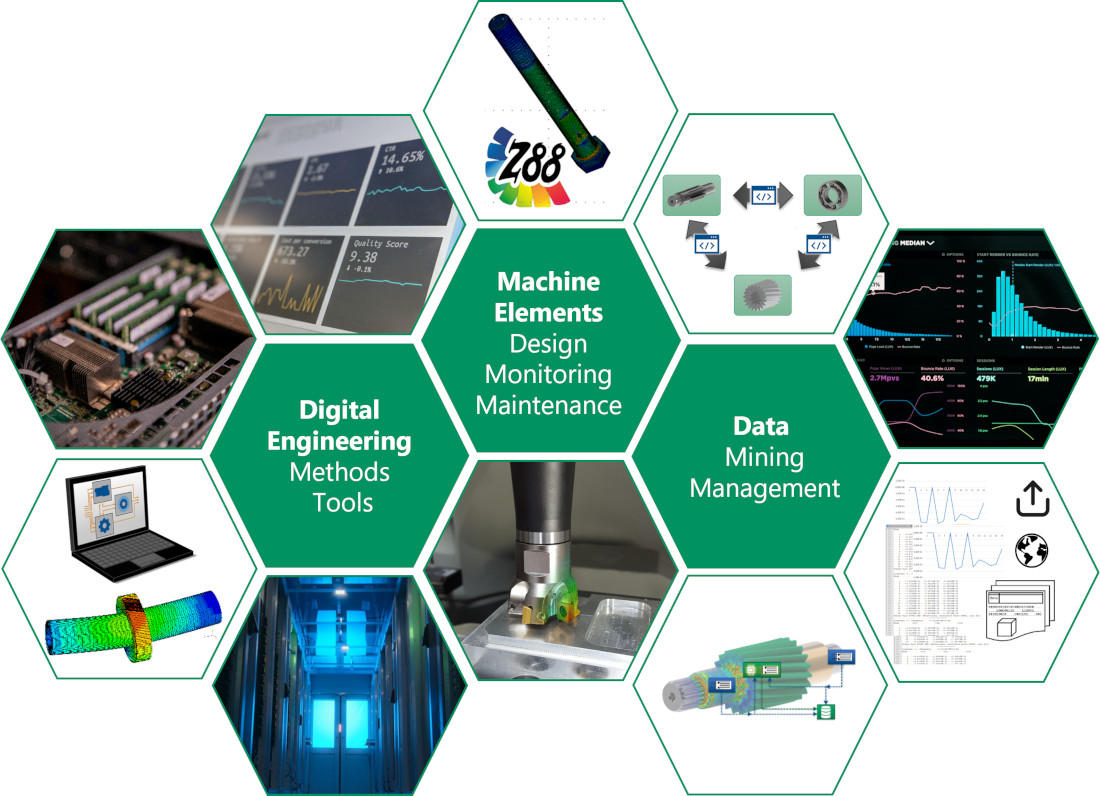Digitalization
The Digitalization team conducts research on various aspects of the product lifecycle with the overall goal of creating transparent, data-consistent, coordinated, and efficient engineering processes and solutions. They combine methods from classical mechanical engineering, virtual product development, and simulation science. The team focuses on topics including the digital twin, acquisition and management of product data, automation of development processes, and the integration of mechatronic machine elements.

The processes and problems considered are mainly assigned to two phases of the product life cycle: product creation and product use.
Regarding the product development process, the team focuses on tasks that arise during technology development in the areas of design, layout, and manufacturing. All the considered processes share the need for coordinated sequencing, methods, and tools to achieve the specific process objectives.
- The team explores, extends and combines the methods and tools of digital engineering to adapt processes to their respective, product-, company- and industry-specific challenges. Only through targeted adaptation, combination and linking of the methods can the potential of digitalization be leveraged and realized in operational applications.
- When linking the various tools, connecting to information sources or networking different process steps, there are often system or media discontinuities. In this context, interfaces take on a decisive role for the smooth exchange of data. The acquisition, exchange and provision of a high-quality database are therefore further research topics addressed by the team. After all, the basis of every functioning process is a consistent and compatible database.
- All emerging information about a product or a process can be stored in the form of a digital twin. Depending on the particular requirements, the digital twin can have different characteristics. The digital twin can only be used profitably in processes if it is tailored to its application.
- As increasing digitalization generates more and more data, questions also arise about how to handle and utilize it. Data-driven methods, complex calculations and simulations require powerful infrastructures to function and generate added value. For this reason, new cross-cutting technologies such as High Performance Computing (HPC) must also be included in the development of end-to-end processes.
In terms of product use, the focus is primarily on condition monitoring and predictive maintenance in the area of machine elements, with an emphasis on couplings, screws and rolling bearings.
- Condition monitoring and predictive maintenance already start with the design of the machine elements, which is why the team is conducting intensive research into the further development of simulation and calculation methods. The optimization of design and design process leads to comprehensive metamodels, which is essential for a complete, digital representation of machines and plants.
- The team also focuses on the further development of classic machine elements into mechatronic machine elements. The latter is still a young field of research. The basic idea is to record machine data close to the respective point of action and to use suitable data processing to draw conclusions about the current state of the machine. The integration of sensors in machine elements that are required anyway is an obvious step. The challenges are to ensure the power supply of the sensors, to transmit the data reliably, and to integrate the additional components into the machine elements in a way that is largely neutral in terms of installation space without negatively affecting their primary function.
- Experimental investigations are used to determine characteristic values, analyze failure mechanisms, define design criteria and safety factors, extend design limits, improve operating behaviour and validate concepts.
Due to the overarching nature of the subject matter, challenges are not only found in detailed studies but also primarily at the strategic level. In addition to technical-functional aspects, economic, social, and ecological requirements must increasingly be incorporated holistically.
